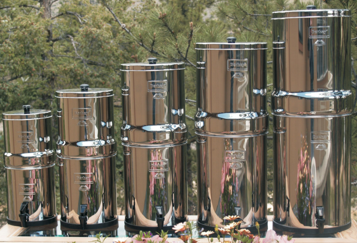It seems to be happening more and more. The floods, fires, mudslides, tornadoes, hurricanes and sundry other natural disasters that make living through the aftermath a frightening challenge.
Food, water, fuel, power, everything we count on and take for granted in daily living becomes difficult or impossible to get.
While some items can be stored against an emergency, this article will address why you need a portable water filter to use in disasters. Our water supply systems are more fragile than you’d imagine when you turn on the tap and get fresh, clean water every time.
A natural disaster can compromise water delivery pipes fouling the water so that it is unsafe. If supply is cut entirely, you can make standing or rainwater safe to drink if you have an appropriate filter. A family with limited food rations can survive for some time. Without water, life expectancy is short.
There are a number of cost effective purification options that you can have at home to hedge against the loss of potable water.
 Let Gravity Do the Work
Let Gravity Do the Work
One option is a gravity-powered filter. Water from whatever source available can be used. Gravity systems operate by, yes, gravity. The user pours the source water into the top portion of the unit, and as gravity does its job and the water makes its way down through a system of nets and filters that remove smaller and smaller pieces of debris and sediment. Finally, there is a filter that looks similar to those found in filtrating water pitchers that removes the microscopic nasty stuff we can’t see. These systems can deliver enough clean water—one gallon per person per day—to survive nicely.  Berkey water filters are gravity based and portable enough to take anywhere.
Berkey water filters are gravity based and portable enough to take anywhere.
Gravity operated systems come in a variety of materials; plastic, ceramic lined metal, even canvas. Prices and sizes vary, so do some research before you make a purchase. The basic operation is the same across all types, its mostly the capacity and portability that vary.
Solar Powered
Another option is a solar powered filter. Obviously, it uses the sun as its power source, but can also be powered by a vehicle’s cigarette lighter or a 12 volt battery. It produces one gallon per minute when electrically powered.
As with most filters discussed here, the solar powered filters have three stages of filtration, which takes out bacteria and virus sized nasties.
These units are far more expensive than the gravity fed variety, but they are fast and reliable as long as the sun is shining. If planning for emergency water supply, it seems wise to rely on gravity or the sun as they are likely to be operational. Batteries don’t last that long and if you have no fuel for the car, the cigarette lighter isn’t likely to work long either.
Hand Pump Filters
Again, there are many varieties of the hand pump filter on the market, and all operate on the same principle. The choice of designs is extensive, and the price range is from around $10 to over $200 based on material and capacity.
The basic premise is the same for all hand pumps. You have the filtration unit with all the good stuff in it that takes the impurities out of the water. You put one hose, dedicated to going into unfiltered water, into the water source. There’s an output hose on the unit that goes into whatever receptacle you have chosen for your clean water.
When all this is in place, you pump. By hand. No power source needed other than a little elbow grease. Some models have a plunger, another a lever. Either way, as fast as you pump, you’ll get clean water as soon as it has passed through the filtration layers.
Storing Your Hard Earned Clean Water
Now that you’ve guaranteed that you have drinkable water, how you store it matters. Many plastics off-gas harmful chemicals and can disintegrate over time.
Purchase food grade plastic containers. These are best for long term storage. If you plan to filter your water as needed and not store it, you can use any high quality water bottle. The Federal Emergency Management Agency, or FEMA, does not recommend re-using milk or juice containers to store water for long periods. Even with scrupulous cleaning the plastic will still harbor proteins and sugars that may prove harmful.
We never want to think about it, and have often left the planning to the “wack-o” survivalists, but after Hurricane Sandy, I’ve taken a new look at being ready. Also you can find multiple healthy living products at HEAMotivation.com.
Choose your filtration system and scope out the swimming pools in your neighborhood; they are a great source of water that you can filter and drink until help arrives.